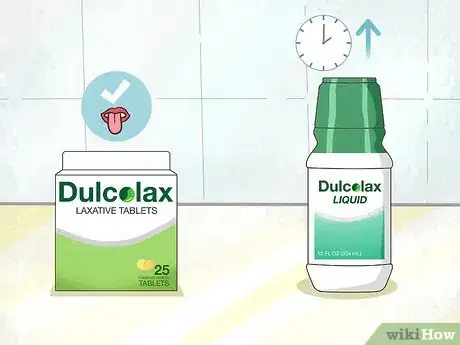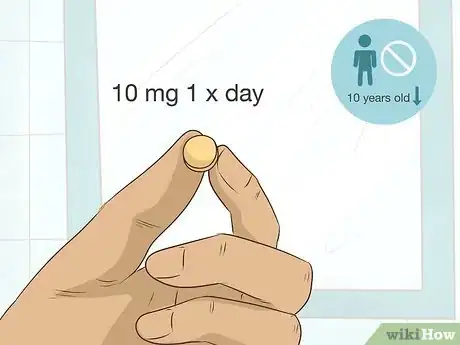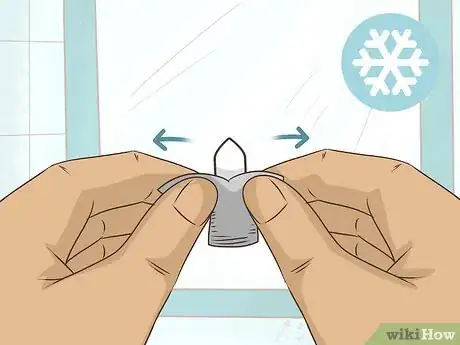This article was medically reviewed by Luba Lee, FNP-BC, MS. Luba Lee, FNP-BC is a Board-Certified Family Nurse Practitioner (FNP) and educator in Tennessee with over a decade of clinical experience. Luba has certifications in Pediatric Advanced Life Support (PALS), Emergency Medicine, Advanced Cardiac Life Support (ACLS), Team Building, and Critical Care Nursing. She received her Master of Science in Nursing (MSN) from the University of Tennessee in 2006.
There are 12 references cited in this article, which can be found at the bottom of the page.
This article has been viewed 27,827 times.
Dulcolax is a laxative used to stimulate a bowel movement. Doctors recommend the medication for relief of occasional constipation or to clear the digestive system in preparation for a medical procedure. When taken orally, it should produce a bowel movement overnight or within 6 to 12 hours after taking a dose, and when taken as a suppository it acts within 30 minutes. Before taking Dulcolax, assess your symptoms to make sure Dulcolax is the correct medicine for you. Then follow all the instructions to relieve your constipation.
Steps
Taking Dulcolax Orally for Overnight Relief
-
1Use Dulcolax to treat occasional constipation. Symptoms of constipation include having less than 3 bowel movements per week, hard stools that are difficult or painful to pass, and feeling like not all stool has passed.[1]
- If your constipation has persisted for 7 days or more, contact your doctor before taking any medication.[2]
-
2Avoid Dulcolax if you have severe digestive upset. Dulcolax may be the right medication for you as long as your constipation is not accompanied by severe stomach pain, nausea, or vomiting. If you experience these symptoms, you may have a more serious condition and should not take Dulcolax. Contact your doctor instead.[3]
- Also avoid Dulcolax if you have a chronic stomach condition like Crohn’s Disease or ulcerative colitis. It can aggravate symptoms of these conditions.
- You should also not take Dulcolax if you’re pregnant.[4]
Advertisement -
3Choose tablets for a better taste or liquid for faster results. Oral Dulcolax comes in tablet and liquid form. Both are designed to relieve occasional constipation. Consider the advantages of each before choosing one.[5]
- Liquid works faster, and produces a bowel movement within 30 minutes to 6 hours.[6] If you want faster relief or have trouble swallowing pills, liquid is a better option. Keep in mind that with liquid, you'll taste the medication, and this may be unpleasant.[7]
- Tablets work slower than liquid, and will take several hours to take effect. Also with tablets you won't taste the medication, so if you find liquid medicine unpleasant this is a better option.
-
4Read the instructions for the recommended dosage. The standard dosage for adults and children over the age of 12 is one 5 mg tablet up to 3 times per day. For children between the ages of 3 and 11, the recommended dose is one 5 mg tablet once or twice daily, preferably at bedtime. The standard dosage for liquid is 5-10 ml for adults and children over 12, and 5 ml for children 3 to 11.[8] Confirm this dosing on the packaging before taking the medication.
- If you’ve never taken bisacodyl before, only take 1 tablet or 5 ml on your first dosage. Then if it doesn’t work well enough within 12 to 24 hours, take 2 tablets or 10 ml for your second dosage the following day.
- Do not give Dulcolax to children under 10 without direction from a doctor. Never give the medication to children under 4.
-
5Take the medicine at night before bed. Dulcolax takes several hours to work. The recommended practice is taking the medication before bed so it can work overnight and produce a bowel movement in the morning.[9]
- The medicine will still work if you take it during the day. If you know you’ll be home when the medicine works, then there is no harm in taking it earlier than bedtime.
-
6Swallow the pill whole with a glass of water if taking tablets. Do not chew or break up the tablet. It must be swallowed whole. Drink a full glass of water while taking it so there is enough liquid in your stomach to activate the medication.[10]
- Dulcolax can be taken on an empty or full stomach.
- If medicine usually upsets your stomach, eating a little food can help prevent this. A piece of bread or some crackers is enough.
-
7Swallow all of the medicine right away if taking liquid. Don't take small sips at a time. This not only prolongs the time you have to taste the medicine, but it delays your body's absorption of the full dose. Give your body the full dose at the same time for the best results.[11]
- You can also dilute the liquid with water. Mix the dosage into a glass of water and swallow the entire mixture.[12]
- Milk inhibits Dulcolax from working. If you have a habit of drinking a glass of milk at bedtime, take your Dulcolax at least an hour before you do this.
-
8Call your doctor if you don’t have a bowel movement the following day. Dulcolax takes several hours to work, so if you take it at bedtime then you should have a bowel movement in the morning. If you don’t have one all day, call your doctor. This could mean you have a blockage in your digestive system that requires medical attention. [13]
- You don’t have to call your doctor if you have a subpar bowel movement that feels like you didn’t empty all the way. This is still progress. Take another dosage at night and allow the medication to work further.
Using Suppositories for Fast Relief
-
1Choose a Dulcolax suppository for an immediate effect. Suppositories are medications inserted rectally. Dulcolax suppositories work much faster than oral forms, and should produce a bowel movement within 15 to 30 minutes.[14] If you require immediate relief, this is your best option.
- If you are using Dulcolax to prep for a colonoscopy or medical exam, it will probably be in suppository form. Your doctor may prescribe suppositories in combination with oral laxatives as well to ensure your digestive system is clear.
-
2Follow the dosage instructions on the medication packaging. The common dosage for a Dulcolax suppository is one 10 mg tablet once per day. These instructions should be printed clearly on the packaging, so confirm that this is the correct dosage.[15]
- Dulcolax suppositories should not be used for children under 10 unless your doctor has directed it.
-
3Make sure the suppository is hard before removing the wrapper. Suppositories should be hard so they can stay in place. If you take it out of the box and it is soft, cool the suppository down to harden it. Either run it under cool water or place it in the refrigerator for a few minutes until it's hard.[16]
-
4Lie down on your left side and raise your right knee to your chest. This position allows the easiest access for you to insert the suppository.[17]
- If you're more comfortable laying on your right side, that's fine too. The important part is that one leg is raised higher than the other.
-
5Insert the suppository into your rectum with the pointed end first. The suppository has to be inserted past the muscular sphincter. This is about 1 inch (2.5 cm) inside your rectum. Push it past this point so it doesn't fall out.[18]
- If the suppository pops out, it probably wasn't deep enough. Insert it again, making sure to push it as far as you can with your finger.
- Consider wearing rubber gloves for this step. If you don't use gloves, wash your hands thoroughly after inserting it.
- Use only 1/2 of a suppository per day for children ages 6 to 11.[19]
-
6Lower your leg and remain lying down for 30 minutes. The suppository needs around 30 minutes to work. Get into a comfortable position on your side and remain laying down for this time. When this time has passed, you can then get up and use the bathroom.[20]
- Even if you feel like you need to use the bathroom after a short time, do your best to wait 30 minutes. If you use the bathroom too soon, the suppository will come out before your body has fully absorbed it.
-
7Call your doctor if you don’t have a bowel movement within 1 hour. Dulcolax suppositories should work in less than an hour. If an hour passes and you haven't had a bowel movement yet, you may have an intestinal blockage or another serious condition. Contact your doctor right away and follow their instructions on how to proceed.[21]
Staying Safe While Taking Dulcolax
-
1Find out if you are allergic to bisacodyl. The active ingredient in Dulcolax is bisacodyl. Some people have an allergy to bisacodyl. If you know you’re allergic to bisacodyl, do not take Dulcolax.[22]
- If you’ve never been tested for this allergy but have had allergic reactions to other medications, get yourself tested before taking Dulcolax. You may have an allergy to several medications, and taking Dulcolax isn’t safe until you know.
-
2Wait 1 hour after taking Dulcolax before taking any other medication. Other medications can interact with Dulcolax and prevent it from working. Antacids or other stomach medications especially interact with Dulcolax. If you regularly take medications, give Dulcolax 1 hour to be absorbed before taking your other medications.[23]
-
3Seek medical attention if you have serious side effects. Common side effects of Dulcolax are usually harmless. They include mild nausea, diarrhea, and stomach cramps. These should subside when the medicine has worked its way out of your system. More serious side effects, however, require medical attention.[24]
- Call your doctor if you experience dizziness, bloody stool, or vomiting. These could be the sign of a serious reaction.
- Call emergency services right away if you have an allergic reaction. These symptoms include an itchy skin rash, hives, tightness in your chest, wheezing, swelling in your mouth or throat, and difficulty breathing.
-
4Stop using Dulcolax after 5 days. Dulcolax is only designed for relief of occasional constipation, so do not take it long term. If your symptoms haven't improved after 5 days, stop taking it and consult your doctor.[25]
- Your doctor may suggest some lifestyle changes to improve your digestive health. Drinking more water, including more fiber in your diet, and exercising regularly can improve your constipation over time.
References
- ↑ https://www.niddk.nih.gov/health-information/digestive-diseases/constipation/symptoms-causes
- ↑ https://www.drugs.com/dulcolax.html
- ↑ https://www.nhs.uk/medicines/bisacodyl/
- ↑ https://www.drugs.com/dulcolax.html
- ↑ https://www.dulcolax.com/products
- ↑ https://www.dulcolax.com/?gclid=CjwKCAjwnrjrBRAMEiwAXsCc4_TNv_9Cnjl40Kc9hVlCLNWZu6uSwnlE8MX6wRV62lC46p6k3gT-yBoCWYIQAvD_BwE
- ↑ https://www.drugs.com/uk/dulcolax-pico-liquid-5-mg-5-ml-oral-solution-leaflet.html
- ↑ https://www.drugs.com/uk/dulcolax-pico-liquid-5-mg-5-ml-oral-solution-leaflet.html
- ↑ https://www.nhs.uk/medicines/bisacodyl/
- ↑ https://www.nhs.uk/medicines/bisacodyl/
- ↑ https://www.drugs.com/uk/dulcolax-pico-liquid-5-mg-5-ml-oral-solution-leaflet.html
- ↑ https://www.medicines.org.uk/emc/product/905/smpc
- ↑ https://www.nhs.uk/medicines/bisacodyl/
- ↑ https://www.dulcolax.com/products
- ↑ https://www.drugs.com/dulcolax.html
- ↑ https://medlineplus.gov/druginfo/meds/a611051.html
- ↑ https://medlineplus.gov/druginfo/meds/a611051.html
- ↑ https://medlineplus.gov/druginfo/meds/a611051.html
- ↑ https://www.dulcolax.com/products/laxative-suppositories
- ↑ https://patient.info/medicine/bisacodyl-dulcolax
- ↑ https://www.drugs.com/dulcolax.html
- ↑ https://patient.info/medicine/bisacodyl-dulcolax
- ↑ https://patient.info/medicine/bisacodyl-dulcolax
- ↑ https://www.drugs.com/dulcolax.html#side-effects
- ↑ https://patient.info/medicine/bisacodyl-dulcolax









































































Medical Disclaimer
The content of this article is not intended to be a substitute for professional medical advice, examination, diagnosis, or treatment. You should always contact your doctor or other qualified healthcare professional before starting, changing, or stopping any kind of health treatment.
Read More...